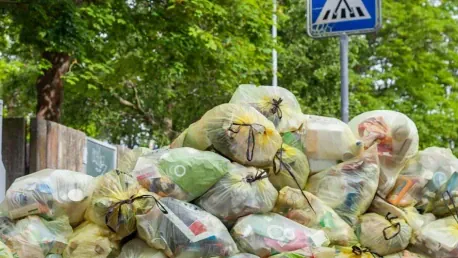The UK’s waste wood industry has made a remarkable impact on carbon emissions this year. Through the utilization of waste wood biomass, the sector has managed to prevent 701,000 tonnes of carbon emissions. This achievement emphasizes the critical role the waste wood industry plays in combating climate change and advancing the circular economy. Beyond its immediate carbon savings, the sector acts as a vital player in overall environmental efforts by repurposing end-of-life products and generating renewable energy.
The Astonishing Impact of Waste Wood Biomass
In 2023, waste wood biomass contributed significantly to reducing the UK’s carbon footprint. By displacing energy generation from more carbon-intensive sources, waste wood biomass saved approximately 701,000 tonnes of carbon emissions. This accomplishment not only highlights the environmental benefits of waste wood but also underscores the sector’s potential to contribute meaningfully to the UK’s net-zero goals. Moreover, it demonstrates how industrial practices, when properly managed, can lead to substantial environmental benefits.
Adopting modern technologies like Carbon Capture and Storage (CCS) presents an opportunity to exponentially increase carbon savings. If CCS is fully implemented, the waste wood biomass sector could potentially save up to 3.6 million tonnes of carbon emissions. These figures illustrate the immense potential for environmental benefits from scaling up waste wood utilization and integrating advanced technologies. The projection aligns well with the UK government’s goal of capturing 23 million tonnes of CO2 annually by 2035, indicating that the waste wood sector could become a cornerstone in national climate strategies.
Supporting Data and Peer Review
The impressive carbon reduction statistics are backed by thorough peer-reviewed data. The Wood Recyclers’ Association (WRA) collected and analyzed waste wood data, which was independently verified by Kiwa, a leading certification body. This rigorous approach ensures the credibility of the reported figures. Such robust data collection and verification processes strengthen the industry’s claims and provide a reliable foundation for future policy recommendations.
Besides the biomass sector, the panel board industry also made substantial contributions. Particle board products sequestered approximately 1.1 million tonnes of carbon, further expanding the environmental benefits of the waste wood industry. Together, these sectors collectively illustrate the comprehensive environmental impact achievable through effective waste wood management. The dual approach of sequestering carbon and generating renewable energy showcases the multi-faceted benefits of robust waste wood recycling practices, underlining the sector’s diverse capabilities.
Contribution to the Circular Economy
The waste wood sector’s contributions extend beyond carbon savings. By reusing waste materials, the industry supports the circular economy, reducing the volume of waste sent to landfills and conserving natural resources. This cyclical process ensures that end-of-life products are repurposed, thus minimizing environmental impact. The sector effectively closes the loop in material usage, making it a key player in sustainable resource management.
One of the key ways waste wood drives the circular economy is through energy generation. Biomass energy, derived from waste wood, serves as a renewable energy source that supports a carbon-neutral energy system. This dual functionality of waste wood—reducing waste and generating renewable energy—positions the sector as a cornerstone in the UK’s sustainable development efforts. The overarching goal is to create a cycle where waste is not only minimized but also transformed into valuable resources, contributing to broader environmental sustainability.
Necessity of Government Support
Despite its successes, the waste wood industry faces several challenges, particularly concerning government support. The expiration of the Renewable Obligation Certificates (ROCS) poses significant risks to the sector’s continued viability. Clarification and extension of support mechanisms are essential to ensure the industry’s sustained contributions to carbon reduction. The uncertainty surrounding ROCS has fueled concerns regarding long-term stability, prompting calls for immediate policy action.
Transitional support is required for the adoption of CCS technology, which could multiply the sector’s carbon savings. Moreover, regulatory confirmation linking Non-Pipeline Transport options to the Greenhouse Gas Removals Business Model is crucial. Without clear and continued governmental backing, the waste wood sector’s future potential could be jeopardized. The absence of such support could undermine the sector’s ability to scale its operations and integrate advanced technologies, thereby limiting its environmental impact.
Industry Voices and Calls to Action
Leaders within the waste wood industry have voiced their concerns and highlighted the need for policy support. Richard Jenkins, chair of the WRA’s Net Zero working group, emphasized the necessity of more robust recycling targets and sustainable support mechanisms. According to Jenkins, the sector’s role in both carbon sequestration and renewable energy generation is vital for the UK’s environmental goals. His statements underscore the urgency for clear and lasting governmental policies to sustain the sector’s achievements.
Richard Coulson, chair of the WRA, echoed these sentiments, calling for definitive transitional support for CCS technology. Coulson stressed that without adequate support, the sector’s ability to achieve the projected 3.6 million tonnes of carbon savings could be compromised. The industry’s leadership remains steadfast in their advocacy for robust policy frameworks, recognizing that such measures are critical to maximize carbon savings and overall sustainability.
The Road Ahead for the Waste Wood Industry
The waste wood industry in the UK has achieved an impressive milestone this year by significantly impacting carbon emissions. By utilizing waste wood biomass, the sector successfully prevented the release of 701,000 tonnes of carbon into the atmosphere. This accomplishment underscores the essential role the waste wood industry plays in the fight against climate change and the promotion of a circular economy. The sector’s efforts go beyond merely reducing carbon emissions; it also contributes positively to the environment by repurposing end-of-life wood products and generating renewable energy.
Moreover, the industry demonstrates how turning waste into a valuable resource can offer sustainable solutions that benefit both the environment and the economy. The reclaimed wood not only finds new life in various applications but also supports energy production in an eco-friendly manner. These initiatives align with broader environmental goals and highlight the industry’s commitment to sustainability. As the demand for renewable energy grows, the waste wood sector is poised to continue making significant contributions to reducing carbon footprints and championing environmental stewardship.









